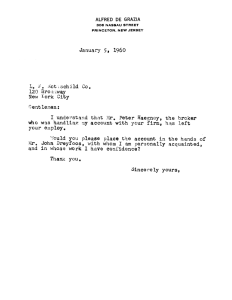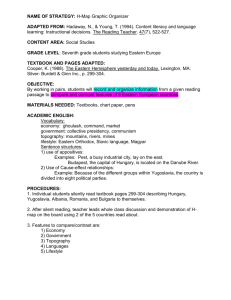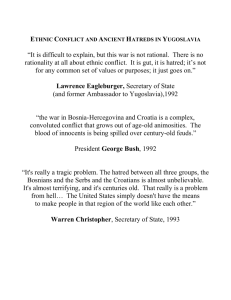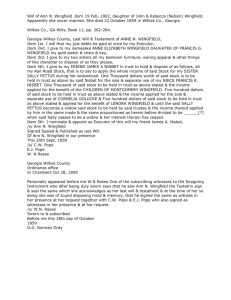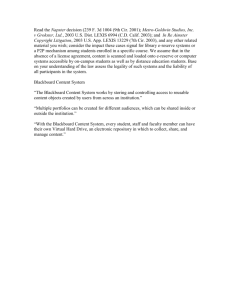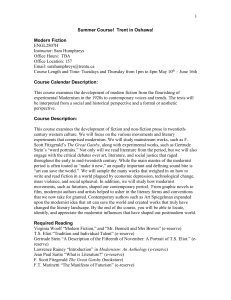HIST 172 - Oberlin College
advertisement
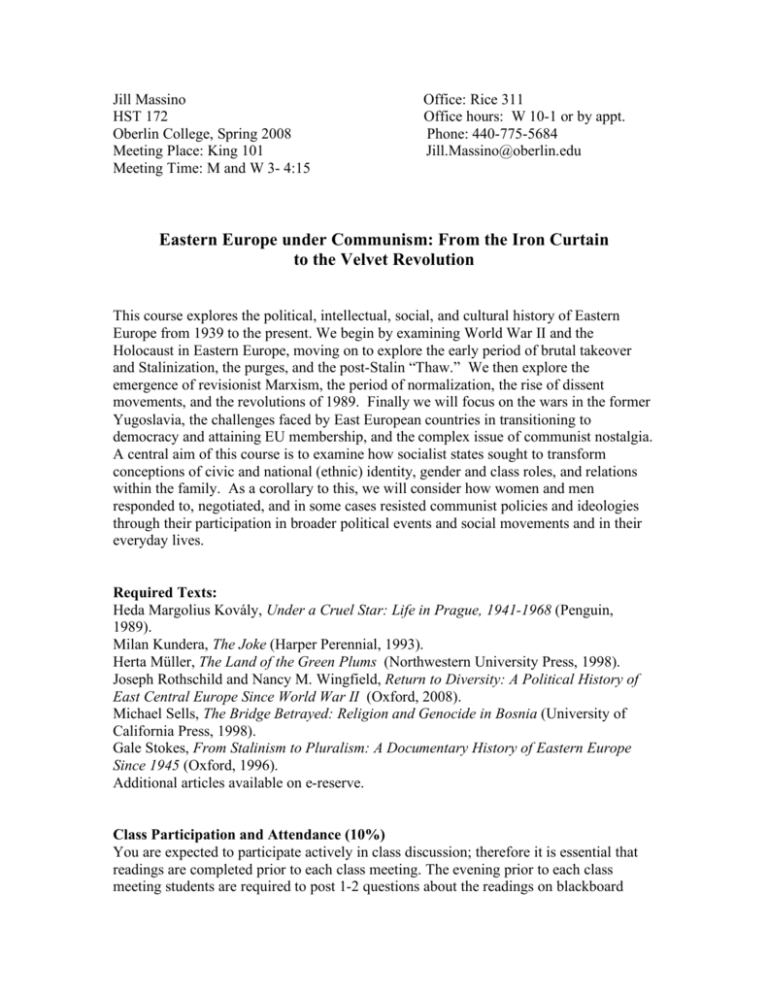
Jill Massino HST 172 Oberlin College, Spring 2008 Meeting Place: King 101 Meeting Time: M and W 3- 4:15 Office: Rice 311 Office hours: W 10-1 or by appt. Phone: 440-775-5684 Jill.Massino@oberlin.edu Eastern Europe under Communism: From the Iron Curtain to the Velvet Revolution This course explores the political, intellectual, social, and cultural history of Eastern Europe from 1939 to the present. We begin by examining World War II and the Holocaust in Eastern Europe, moving on to explore the early period of brutal takeover and Stalinization, the purges, and the post-Stalin “Thaw.” We then explore the emergence of revisionist Marxism, the period of normalization, the rise of dissent movements, and the revolutions of 1989. Finally we will focus on the wars in the former Yugoslavia, the challenges faced by East European countries in transitioning to democracy and attaining EU membership, and the complex issue of communist nostalgia. A central aim of this course is to examine how socialist states sought to transform conceptions of civic and national (ethnic) identity, gender and class roles, and relations within the family. As a corollary to this, we will consider how women and men responded to, negotiated, and in some cases resisted communist policies and ideologies through their participation in broader political events and social movements and in their everyday lives. Required Texts: Heda Margolius Kovály, Under a Cruel Star: Life in Prague, 1941-1968 (Penguin, 1989). Milan Kundera, The Joke (Harper Perennial, 1993). Herta Müller, The Land of the Green Plums (Northwestern University Press, 1998). Joseph Rothschild and Nancy M. Wingfield, Return to Diversity: A Political History of East Central Europe Since World War II (Oxford, 2008). Michael Sells, The Bridge Betrayed: Religion and Genocide in Bosnia (University of California Press, 1998). Gale Stokes, From Stalinism to Pluralism: A Documentary History of Eastern Europe Since 1945 (Oxford, 1996). Additional articles available on e-reserve. Class Participation and Attendance (10%) You are expected to participate actively in class discussion; therefore it is essential that readings are completed prior to each class meeting. The evening prior to each class meeting students are required to post 1-2 questions about the readings on blackboard (these questions must be posted by 8 pm so that your colleagues will have ample time to read and reflect on them). You are exempt from three posts over the course of the semester. Midterm Exam (30%) This will be an in-class exam covering key figures, terms, events, and ideas examined in class and in the readings up to this point. Take Home Final (40%) 2-3 essay questions due the day of the final. Book Reflections (10% each; 20% total) You are expected to write a 3-4 page book reflections on TWO of the following books: Under and Cruel Star, The Joke, Land of the Green Plums. Rather than a simple summary, you should write a critical analysis of the book in which you place it in its specific historical context and consider its relevance to broader themes and issues of socialist Eastern Europe. The reflections will serve as springboards for class discussion. Due dates for the reflection papers are marked on the syllabus. You are exempt from posting reading questions when you turn in a reading reflection. Grading Scale A = 94-100% A- = 90-93% B+ = 87-89% B = 83-86% B- = 80-82% C+ = 77-79% C = 73-76% C- = 70-72% D + = 67-69% D = 66-60 F = 59% and below Late assignments will be marked down 1/3 of a grade per day (B to B-). Extensions will be granted in cases of documented personal illness and family emergency. Honor Code All work is governed by the Honor Code. Any student found cheating, plagiarizing, turning in another’s work as his/her own or otherwise violating the instructor’s explicit or implicit instructions will be subject to a hearing before the Student Honor Committee. To learn more about the code, please go to: http://www.oberlin.edu/students/links-life/rules-regs07-08/honorcode.pdf Services for Students with Disabilities If you are a student with a documented disability who will require accommodations in this course please contact Jane Boomer, Coordinator of Services for Students with Disabilities in G27 Peters Hall, ext. 58467. Course Calendar Week I: Course Introduction/What is Eastern Europe?/ What is Socialism?/ February 4: Course Introduction/What is Eastern Europe? 2 February 6: What is Socialism?/ Eastern Europe during the interwar period Rothschild and Wingfield, chapter 1 Karl Marx and Friedrich Engels: The Communist Manifesto (1848) at: http://www.wsu.edu:8080/~wldciv/world_civ_reader/world_civ_reader_2/marx.html V.I. Lenin, “What is to be Done? (1902) at: http://www.fordham.edu/halsall/mod/1902lenin.html Week II: World War II and the Communist Takeovers February 11: World War II and the “Liberation” of Eastern Europe Stokes: “Report of the Crimea Conference,” “The Yalta Negotiations,” “The Percentages Agreement,” Harry S. Truman, “The Truman Doctrine,” and Andrei Zhdanov, “The TwoCamp Policy” Rothschild and Wingfield, chapter 2 February 13: The Communist Takeovers and the Stalinization of Eastern Europe Stokes: Jakub Berman “The Case for Stalinism” Rothschild and Wingfield, chapter 3 Week III: Mobilizing the New Socialist Man and Woman/The Purge Trials February 18: Mobilizing the New Socialist Man and Woman Padraic Kenney, “Remaking the Polish Working Class: Early Stalinist Models of Labor and Leisure,” Slavic Review, 53:1 (Spring 1994), 1-25 e-reserve Basia Nowak, “Constant Conversations: Agitators in the League of Women in Poland during the Stalinist Period,” Feminist Studies, 31, no. 3, (Fall 2003) e-reserve February 20: The Tito-Stalin Split/The Purge Trials Stokes: “The Tito-Stalin Correspondence,” “The Trial of László Rajk” and “The Slánsk! Trial” Rothschild and Wingfield, chapter 4 Week IV: The Purge Trials in Czechoslovakia/ Coming of Age in post-Stalinist Yugoslavia February 25: The Purge Trials in Czechoslovakia Kovaly, Under a Cruel Star Film: A Trial in Prague (selections) Book Reflection 1 Due 3 February 27: Coming of Age in post-Stalinist Yugoslavia Film: Tito and Me (Goran Markovi", 1992) (I’ll be at a conference, but make sure to attend class as we’ll discuss the film on March 3) Week V: From Freeze to Thaw: the de-Stalinization of Eastern Europe March 3: Thaws, Revolts, and Rebellions Nikita Khrushchev: Secret Speech to the Closed Session of the Twentieth Party Congress, February 25, 1956 at http://www.fordham.edu/halsall/mod/krushchevsecret.html Stokes: Imre Nagy, “Reform Communism,” Gyorgy Lukacs, “Contemporary Problems of Marxist Philosophy” and Milovan Djilas, “The New Class” Rothschild and Wingfield, pp. 118-129 March 5: Gender, Culture, and Consumption under Socialism Uta Poiger, “Rock 'n' Roll, Female Sexuality, and the Cold war Battle over German Identities.” Journal of Modern History, Sep 1996, Vol. 68 Issue 3 e-reserve David Crowley, “Warsaw Interiors: The Public Life of Private Spaces, 1949-65,” in David Crowley and Susan Reid eds., Socialist Spaces: Sites of Everyday Life in the Eastern Bloc (Berg, 2002) e-reserve Week VI: Socialism and Disillusionment in Czechoslovakia March 10: Socialism and Disillusionment in Czechoslovakia Begin Kundera, The Joke Screening of The Joke pt.1 (dir. Jaromil Jire#, 1968) March 12: Socialism in Czechoslovakia Finish Kundera, The Joke Screening of The Joke pt. 2 Book Reflection 2 Due Week VII: Springtime of Nations: Marxist Revisionism in Poland, Yugoslavia, and Czechoslovakia March 17: Springtime of Nations: Marxist Revisionism in Poland, Yugoslavia, and Czechoslovakia Stokes: “The Kuron-Modzelewski Letter to the Party,” “The Praxis Group” “Towards a Democratic Political Organization of Society,” and Ludvik Vaculik “Two Thousand Words to Workers, Farmers, Scientists, Artists, and Everyone” Rothschild and Wingfield, pp. 133-139; 144-152 March 19: Midterm Exam 4 Week VIII: Spring Break Week IX: Repression and Normailization March 31: Normailization and “Living as if” Stokes: “The Helsinki Accords,” “Charter 77,”and Václav Havel, “The Power of the Powerless” Paulina Bren, “Weekend Getaways: The Chata, the Tramp and the Politics of Private Life in Post-1968 Czechoslovakia” in Crowley and Reid eds. Socialist Spaces e-reserve Rothschild and Wingfield, pp. 165-168 April 2: Stalinism for all Seasons: Romania Rothschild and Wingfield, pp. 129-133 Begin Müller, The Land of the Green Plums Week X: Stalinism for all Seasons: Romania April 7: The Survival of Stalinism: Romania Finish Müller, The Land of the Green Plums Katherine Verdery, "The 'Etatization' of Time in Ceausescu's Romania" Book Reflection 3 Due April 9: What’s Happening in Bulgaria and Albania? Stephen Ashley, “The Bulgarian Rock Scene under Communism (1962-1990) in Sabrina Ramet, ed. Rocking the State: Rock Music and Politics in Eastern Europe and Russia (Westview, 1994) e-reserve Week XI The Rise of Anti-Politics and Dissent April 14: Solidarity and Martial Law in Poland Stokes: “KOR’s Appeal to Society,” “Pope John Paul II Speaks in Victory Square, Warsaw,” “Solidarity’s Program,” “Jaruzelski Declares Martial Law,” and Adam Michnik “Letter from Gdansk Prison” Shana Penn, Solidarity's Secret: The Women Who Defeated Communism in Poland (selections) e-reserve Rothschild and Wingfield, pp. 153-165 April 16: Youth and Dissent Stokes: Sabine Rosenbladt, “Environmental Concerns in Poland” Padraic Kenney, “How the Smurfs Captured Gargamel, Or A Revolution of Style,” in Kenney, A Carnival of Revolution: Central Europe 1989 (Princeton, 2002) e-reserve 5 Week XII: The Velvet Revolution/The Disintegration of Yugoslavia April 21: The Velvet (and not so velvet) Revolutions Stokes: “The Opening of the Berlin Wall” and Havel “New Year’s Day Speech, 1990” Rothschild and Wingfield, chapter 7 April 23: Yugoslavia from Unity to Disintegration Begin Michael Sells, The Bridge Betrayed Week XIII: The War in Yugoslavia April 28: The War in Yugoslavia Finish Sells, The Bridge Betrayed Film: Vukovar (dir. Boro Dra#kovi", 1996) April 30: Justice and Post-war Yugoslavia Slavenka Drakuli", They Would Never Hurt a Fly: War Criminals on Trial in The Hague (Viking Adult, 2004) (selections, e reserve) check out the International Criminal Tribunal for the Former Yugoslavia (ICTY) at: http://www.un.org/icty/ WEEK XIV: The Transition to Democracy and EU Integration May 5: The Transition to Democracy and EU integration Rothschild and Wingfield, pp. 211-234 May 7: Remembering Communism Richard S. Esbenshade, “Remembering to Forget: Memory, History, National Identity, in Post-war East Central Europe” in Representations (Winter, 1999) e-reserve Jill Massino “Identities in Transition: Gender, Nostalgia, and Everyday Life in Post-Communist Romania” 6
